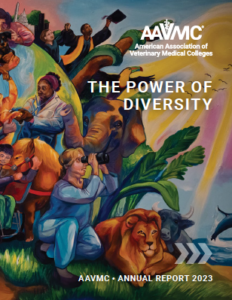The critical role that veterinarians play through participation in biomedical research teams is increasingly being recognized and promoted. In June 2014, the National Institutes of Health (NIH) Physician-Scientist Workforce Working Group released its report that recognized that veterinarians have been an overlooked component of the physician-scientist workforce and outlined steps to address this issue. See the full report.
Across its Institutes and Centers, NIH runs a variety of training and loan repayment programs. The Office of Research Infrastructure Programs (ORIP) offers training and professional development opportunities specifically for veterinarians at different stages of their research careers.
Predoctoral Opportunities
- The T32 program supports veterinary students for one year’s immersion in hypothesis-based laboratory animal medicine, comparative medicine, or pathology. All training activities must be on a full-time basis during the year away from clinical instruction for the D.V.M. degree. This training may be incorporated into the requirements for a M.S. or Ph.D. degree program.
- The T35 Summer Program for Veterinary Students provides research training experiences for selected veterinary students for periods of 2-3 months. The objective is to attract highly qualified veterinary students to biomedical and biobehavioral research careers. They are intended to introduce students to research in cases where they might not otherwise have an opportunity to gain such experience.
Postdoctoral Opportunities
- The Postdoctoral T32 Training Program trains highly qualified veterinarians for research careers in biomedical areas related to comparative medicine. This training may be incorporated into the requirements for a research degree program. The research accomplished under this training program should provide the trainee with the necessary tools to successfully compete for independent grant funding.
- The NIH Pathway to Independence (PI) Award (K99/R00) provides opportunities for postdoctoral scientists to receive both mentored and independent research support from the same award.
- The Special Emphasis Research Career Award (SERCA) in Pathology and Comparative Medicine (K01) supports graduate veterinarians with research experience to become independent biomedical investigators.
Other Programs of Interest
The Clinical and Translational Science Awards (CTSA) program administered by the National Center for Advancing Translational Sciences supports two types of clinical research training awards at CTSA institutions.
- The KL2 Mentored Career Development Program is for clinical investigators who have recently completed professional training and who are commencing basic, translational and/or clinical research. The award provides salary support and protected time for highly qualified junior faculty to conduct multidisciplinary clinical or translational research. The program helps ensure that a diverse pool of highly trained scientists is available in adequate numbers and in appropriate research areas to address the nation’s biomedical, behavioral and clinical research needs.
- TL1 Clinical Research Training Awards support students seeking a practical introduction to clinical and translational research. The CTSA-funded institution selects TL1 candidates, providing full-time research training support for predoctoral candidates and combined health-professional doctorate-master’s candidates as well as postdoctoral fellows seeking additional training in clinical research. The TL1 goal is to increase the number of well-trained clinician-scientists who can lead the design and oversight of future clinical investigations.
The NIH Extramural Loan Repayment Program
As a result of AAVMC’s advocacy, veterinarians who participate in clinical research for human diseases or conditions are now eligible for the National Institutes of Health (NIH) Extramural Loan Repayment Program for Clinical Research (LRP-CR). Veterinarians participating in clinical research as noted in the information provided on the website listed below are invited to apply for participation in this program. Extramural LRPs provide for the repayment of educational loan debt up to $35,000 annually for qualified health professionals performing research within the mission of NIH and supported by domestic, non-profit or government entities. LRP applications are accepted annually from September 1 through November 15, 8:00 p.m., EST. Applications must be submitted electronically using the NIH loan repayment program website.







SHARE